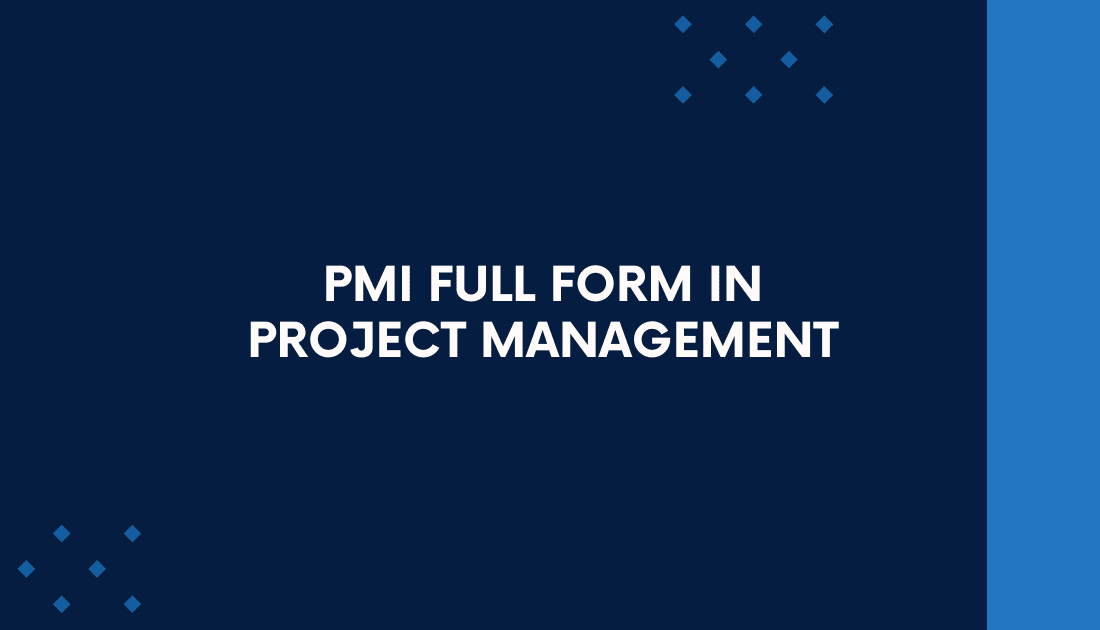If you’re interested in project management, then you’ve probably heard of PMI full form in project management. But what is PMI in project management, and why does it matter? Well, PMI stands for the Project Management Institute, which is a professional organization dedicated to advancing the practice of project management.
Whether you’re just starting out in your career or have been managing projects for years, PMI can provide you with resources and certifications that can help take your skills to the next level.
At its core, PMI’s mission is all about ensuring that projects are completed successfully. This means providing project managers with the tools they need to plan effectively, execute efficiently, and deliver results that meet stakeholders’ expectations.
With more than 700,000 members across the globe, PMI has become one of the most respected organizations in the industry – and if you’re serious about becoming a better project manager yourself, then it’s definitely worth learning more about what they have to offer.
What Is PMI Project Management? Overview and Definition
Pmi Project Management Definition: The Project Management Institute (PMI) is a renowned not-for-profit professional membership association dedicated to the field of project management. Since its establishment in 1969, PMI has emerged as a global leader, offering valuable resources, networking opportunities, and best practices to assist individuals in effectively managing projects and portfolios.
With a strong commitment to excellence, PMI has become a trusted partner for over 2.9 million professionals across numerous countries, supporting their continuous growth and success.
A key reason for PMI’s significance in project management lies in its substantial impact on industry standards. PMI ensures that professionals meet rigorous criteria and adhere to high standards. These certifications hold immense value and earn widespread respect from employers, thereby fostering the efficient and effective completion of projects.
The Project Management Body of Knowledge (PMBOK) Guide
Under the auspices of PMI, the Project Management Body of Knowledge (PMBOK) Guide serves as a comprehensive documentation of industry standards and guidelines for proficient project management. This guidebook, considered a vital resource, encompasses the collective wisdom and expertise of PMI.
Project management professionals worldwide rely on the PMBOK Guide to navigate the complexities of their careers, enhance business outcomes, and effectively oversee diverse project types.
By championing project management excellence and offering a wealth of knowledge, PMI plays a pivotal role in empowering professionals to excel in their respective fields. With its robust framework and dedication to advancing the project management profession, PMI continues to shape the industry, foster collaboration, and drive successful project outcomes on a global scale.
PMI’s Mission and Vision
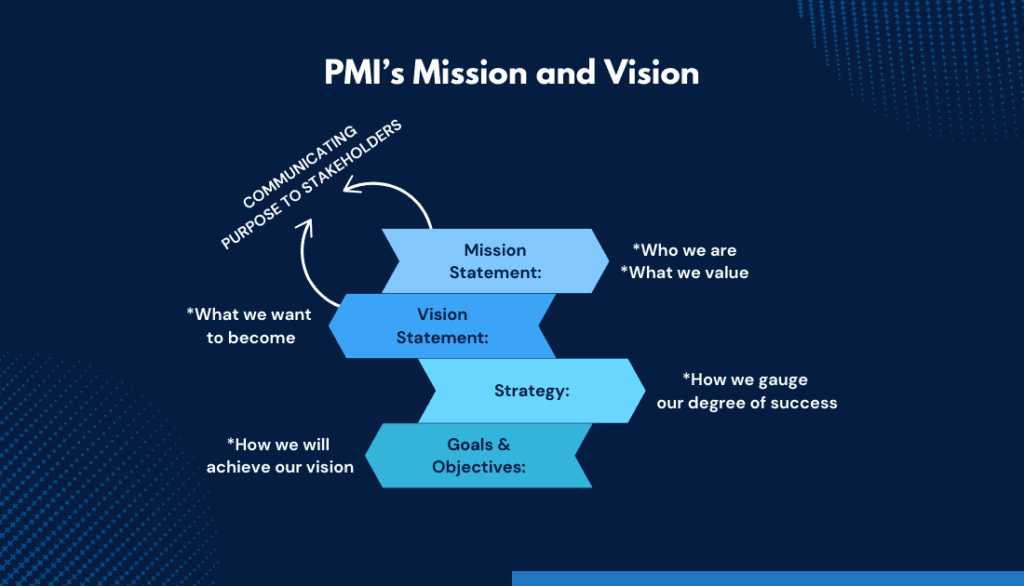
As you delve deeper into PMI’s mission and vision, you’ll discover three key points: advancing the practice of project management, promoting professionalism, and upholding ethical standards.
By striving to advance the practice of project management, PMI aims to improve the way projects are executed, ultimately leading to better results for businesses and organizations.
Advancing the Practice of Project Management
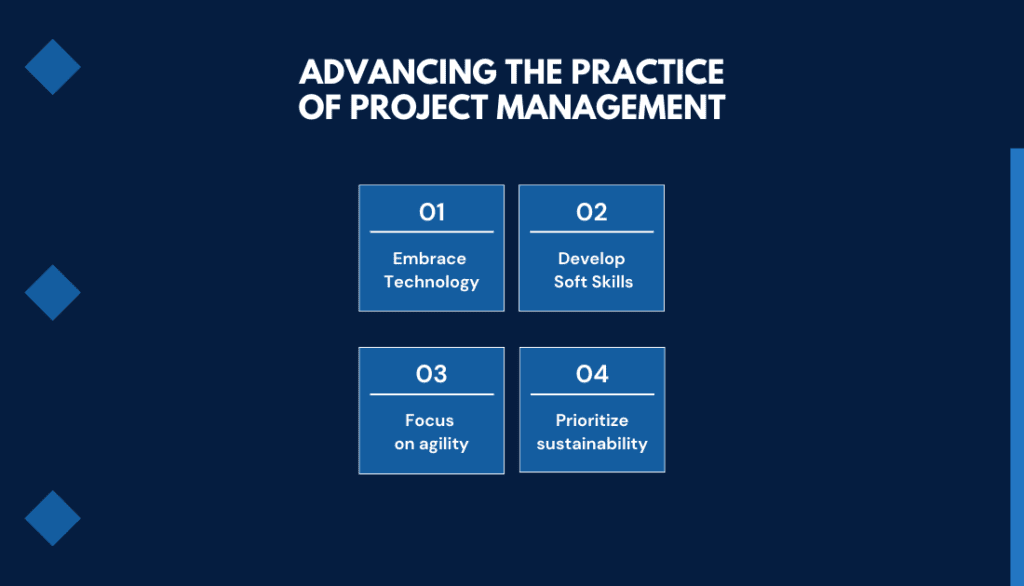
To achieve better results for businesses and organizations, PMI focuses on advancing the practice of project management through three key points: improving project execution, promoting professionalism, and upholding ethical standards.
As a project manager, it is crucial to stay updated with the latest project management trends to deliver high-quality results within budget and on time. Here are four considerations for the future of project management:
- Embrace technology: Leverage tools and software to streamline processes and enhance collaboration.
- Develop soft skills: Communication, leadership, and adaptability are increasingly valuable for successful project management.
- Focus on agility: Agility is vital in today’s fast-paced business environment; adopting agile methodologies helps teams remain flexible and responsive.
- Prioritize sustainability: Integrate sustainable practices into project management strategies as businesses become more environmentally conscious.
Promoting Professionalism and Ethics
Promoting professionalism and ethics is essential for project managers to excel in their roles. Handling ethical dilemmas with integrity and transparency is crucial in any project. Open communication among team members should be encouraged to ensure awareness of ethical standards and guidelines.
Professional conduct plays a significant role in project management. Project managers should set an example by upholding high standards of behavior and respecting others’ opinions.
Remember that your actions reflect not only on yourself but also on the entire team and organization. Prioritizing professionalism and ethics fosters a positive working environment that builds trust and respect among team members.
Who can benefit from PMI membership?
PMI membership offers a wealth of benefits and opportunities for individuals and teams seeking to excel in project management. Whether you are an experienced project manager or an aspiring practitioner looking to enhance your skills.
PMI membership provides a valuable platform for growth and development within the industry. While the advantages of PMI membership extend to a wide range of professionals, it is particularly well-suited for those working in industries such as Construction, Architecture, Finance, Consulting, Governance, and Quality Assurance.
By leveraging PMI membership in these sectors, individuals and teams can gain mastery over project management and effectively navigate large-scale projects.
Empowering Project Management Professionals
PMI membership caters to individuals who identify themselves as active project management professionals. This encompasses project managers and practitioners eager to enhance their expertise and explore potential avenues for professional growth.
Irrespective of the industry you belong to, PMI membership can be a valuable resource for anyone seeking to improve their project management capabilities. However, it is particularly advantageous for professionals in fields like Construction, Architecture, Finance, Consulting, Governance, and Quality Assurance.
The utilization of PMI membership within these industries empowers individuals and teams to seize control of their projects, ensuring successful management on a large scale.
PMI Certification: Elevate Your Professional Journey
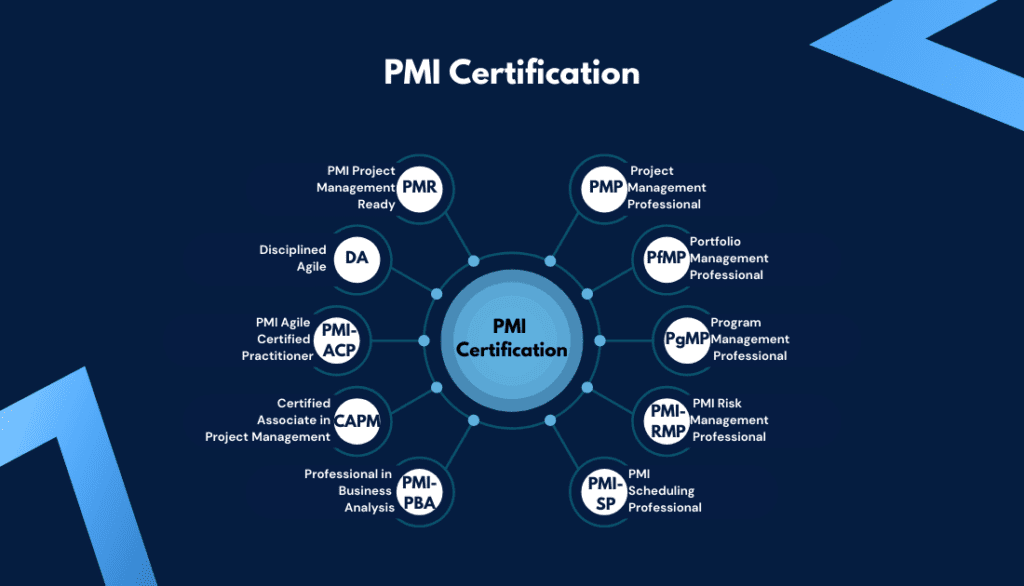
PMI provides a comprehensive array of credentials and certifications tailored to meet the diverse needs of professionals across various stages of their careers. Whether you are an experienced project manager or a newcomer in the field, PMI offers certifications that align with your specific requirements.
With both entry-level and specialized certification schemes, PMI enables professionals to acknowledge their expertise and competence, leveraging these credentials to advance and excel in their respective professions.
Recognizing Knowledge and Enabling Growth
PMI certification serves as a recognition of an individual’s proficiency and serves as a catalyst for career progression. Regardless of your current career stage, PMI’s certification programs are designed to equip professionals with the necessary tools and knowledge to thrive in their roles.
From entry-level certifications that establish a strong foundation for newcomers, to specialized certifications that enhance expertise in specific domains, PMI empowers professionals to showcase their skills and leverage them for professional growth.
By attaining PMI certification, individuals gain a competitive edge, opening up a world of opportunities to expand their horizons and make significant contributions in their chosen field.
Explore a Range of PMI Certifications for Project Management Professionals
1. Project Management Professional (PMP)
PMP is the most popular and globally recognized certification offered by PMI. It is ideal for experienced project managers who aim to advance their careers and demonstrate their comprehensive understanding of project management principles and practices.
2. Certified Associate in Project Management (CAPM)
CAPM is suitable for professionals who are new to project management and want to gain a solid foundation in the field. It is an entry-level certification that provides individuals with the fundamental knowledge and skills required to contribute effectively to project teams.
3. PMI Agile Certified Practitioner (PMI-ACP)
PMI-ACP is specifically designed for project managers who work with Agile methodologies. This certification recognizes professionals’ competency in Agile project management and their ability to adapt to changing project requirements.
4. Disciplined Agile
PMI offers several certifications in Disciplined Agile, including Disciplined Agile Scrum Master (DASM), Disciplined Agile Senior Scrum Master (DASSM), Disciplined Agile Coach (DAC), and Disciplined Agile Value Stream Consultant (DAVSC). These certifications cater to different levels of experience and enable professionals to enhance their skills in Agile and Scrum practices.
5. Professional in Business Analysis (PMI-PBA)
PMI-PBA certification focuses on business analysis within the project management context. It is suitable for professionals who want to specialize in business analysis and effectively manage business objectives in projects.
6. Program Management Professional (PgMP)
PgMP certification is designed for experienced program managers who oversee multiple projects and align them with organizational goals. It validates professionals’ ability to handle complex tasks across diverse organizations and locations.
7. Portfolio Management Professional (PfMP)
PfMP certification is intended for professionals who manage portfolios and demonstrate their expertise in portfolio management. It highlights their capability to align portfolios with organizational objectives and drive business success.
8. PMI Risk Management Professional (PMI-RMP)
PMI-RMP certification recognizes professionals’ expertise in identifying, assessing, and mitigating project risks. It is ideal for risk management professionals who want to enhance their skills and contribute to successful project outcomes.
9. PMI Scheduling Professional (PMI-SP)
PMI-SP certification focuses on professionals’ proficiency in project scheduling. It emphasizes their ability to create and maintain optimal project schedules, considering factors such as duration estimation and schedule risk analysis.
10. PMI Project Management Ready
PMI Project Management Ready is a unique certification designed for students and individuals seeking an introduction to project management concepts. It provides foundational knowledge and skills in project management, offering a pathway to future professional growth.
Are PMI Certifications Worth It? A Closer Look at Their Value and Impact
Professional certifications offered by the Project Management Institute (PMI) can serve as a testament to your project management skills and competence, effectively showcasing your expertise to employers and industry peers.
However, determining the worth of a PMI certification and its potential to enhance your career trajectory requires careful consideration of various factors, including your specific circumstances, industry, and professional goals.
While certain employers may prioritize candidates with PMI certifications, it is important to note that there are numerous career opportunities available that do not explicitly require these certifications.
Examining the Financial Benefits of PMI Certifications
Research indicates a correlation between specific PMI certifications and financial gains. Notably, the Project Management Professional (PMP) certification has been associated with higher incomes.
In the United States, project managers earn a median salary of $116,000 across various industries, and the majority of them typically make between $93,000 and $140,000.
Steps to Obtain a PMI Certification: A Comprehensive Guide
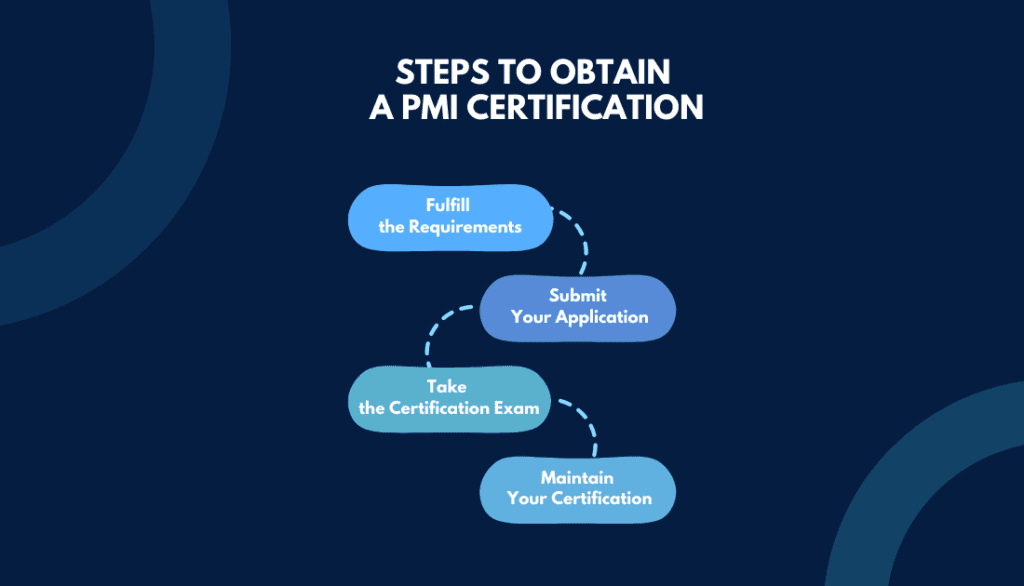
Step 01: Fulfill the Requirements
Each PMI certification has specific prerequisites that must be met before you can pursue the certification. It is essential to review and ensure that you meet the necessary criteria, including relevant project management experience, before proceeding with the application process.
Step 02: Submit Your Application
Create an account with PMI and submit your certification application once you believe you meet the eligibility criteria. If your application is approved, you will be required to pay the exam fee and schedule your certification exam.
Step 03: Take the Certification Exam
PMI certification exams typically last three to four hours and consist of various question formats, such as multiple-choice, multiple-response, matching, hotspot, and fill-in-the-blank. Some advanced certifications may also involve a panel review as part of the certification process.
Step 04: Maintain Your Certification
PMI certifications remain valid for a period of three years. During this time, you must earn a specified number of PDUs (Professional Development Units) to ensure the continued validity of your certification.
PDUs can be earned through activities such as learning, teaching, or volunteering in the field of project management, with each PDU typically equating to one hour of participation. The number of PDUs required for maintaining your certification will vary based on the specific certification obtained.
Conclusion
So, now you know what PMI full form in project management and PMI meaning. It is a well-respected organization that provides resources and certifications to professionals in the field. PMI’s mission is to advance the practice of project management and it does so through its global reach and vast array of resources.
One of the most sought-after certifications is the Project Management Professional (PMP) certification, which demonstrates a high level of knowledge and expertise in project management.
Take control of your projects and achieve seamless collaboration with Onethread! Streamline your organization, planning, management, and execution processes effortlessly. With Onethread, the all-in-one project management solution tailored to meet your growing business needs, you’ll experience unmatched efficiency and productivity.
Frequently Asked Questions
How Much Does It Cost To Get Certified By PMI?
Getting certified by PMI can cost around $500-$1,500 depending on membership status and exam location. However, the benefits of certification include increased job opportunities and higher salaries in project management roles.
What Is The Difference Between Pmp And Acp Certifications?
Wondering about the difference between PMP and ACP certifications? PMP focuses on traditional Waterfall project management, while ACP is for Agile methodologies like Scrum. Both are valuable in their own ways.
Does PMI Offer Any Training Programs For Project Management?
Looking to enhance your project management skills? PMI training programs offer a variety of courses and certifications to help you succeed. Certification benefits include increased job opportunities, higher salaries, and professional recognition.
How Long Does It Typically Take To Prepare For A PMI Certification Exam?
On average, it takes about 3-6 months to prepare for a PMI certification exam. Recommended study materials include the PMBOK Guide and practice exams. Focus on your weak areas and use flashcards to memorize key terms.
Can PMI Certifications Be Obtained Online Or Must They Be Taken In Person?
You can obtain PMI certifications through online or in-person training. Online training offers convenience and flexibility, but in-person training provides more interaction and guidance. Consider the pros and cons of each option before making a decision.
